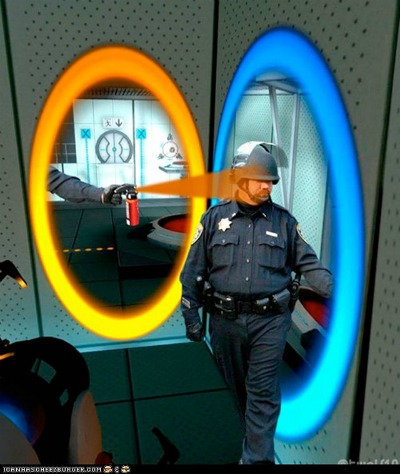Personally, I think it is awesome that Wikipedia has an entry that simply lists fictional diseases. But it is a bit odd given other things that Wikipedians decide are not noteworthy enough to have their own page, that a list of fictional diseases makes the cut.
Month: December 2011
Portal Pepper Spray Cop
The Beauty of Plain Text Files
I couldn’t agree more with Chris Smith over at LifeHack.Org who has written an article on Why Geeks Love Plain Text (And Why You Should Too).
The thing is, plain text is something that is just obvious to me — saying you should generally use plain text is a bit like saying you should back up your documents regularly.
The rest of the world, however, seems to be in love with their Office documents. I can’t count the number of times people have needed to send me a short list, like a 5 or 6 point agenda, and they send it along in email as a Microsoft Word attachment.
The only thing I’d add to Smith’s article is that the best text editor I’ve ever used on Windows is still the venerable TextPad. There may be better text editors for coding purposes, but for straight up writing, nothing beats TextPad.
SH Monster Arts Godzilla and Mechagodzilla Action Figures
These 6-inch Godzilla and Mechagodzilla action figures from SH Monster Arts have an incredible level of detail and 29-points of articulation. Unfortunately that quality also comes at a price — $80 apiece for each of these. These figure are currently scheduled to ship in January 2012.


Evolution, Stop Following Me! T-Shirt
Zazzle sells this awesome evolution-themed shirt,

Is Full Disk Encryption Too Good?
This paper by four security researchers on the effects of whole disk encryption on forensic investigations garnered a lot of press after it suggested that the increasing use of full disk encryption tools is hampering some investigations. According the paper’s abstract (emphasis added),
The increasing use of full disk encryption (FDE) can significantly hamper digital investigations, potentially preventing access to all digital evidence in a case. The practice of shutting down an evidential computer is not an acceptable technique when dealing with FDE or even volume encryption because it may result in all data on the device being rendered inaccessible for forensic examination. To address this challenge, there is a pressing need for more effective on-scene capabilities to detect and preserve encryption prior to pulling the plug. In addition, to give digital investigators the best chance of obtaining decrypted data in the field, prosecutors need to prepare search warrants with FDE in mind. This paper describes how FDE has hampered past investigations, and how circumventing FDE has benefited certain cases. This paper goes on to provide guidance for gathering items at the crime scene that may be useful for accessing encrypted data, and for performing on-scene forensic acquisitions of live computer systems. These measures increase the chances of acquiring digital evidence in an unencrypted state or capturing an encryption key or passphrase. Some implications for drafting and executing search warrants to dealing with FDE are discussed.
The sentences I added emphasis to are interesting. Once a laptop or computer that has been encrypted with FDE is shut off, gaining access to the data is going to be extremely difficult unless the password/passphrase used is very weak or easily guessable, or if the owner can be persuaded, compelled or tricked into surrendering it. On the other hand, if the machine is left on when investigators arrive, there are a number of ways to recover the key, including using a cold boot attack where the RAM is preserved and copied in an effort to recover the key.
So if your computer is likely to be the focus of one of these attacks, ideally there needs to be a way to shut it down as quickly as possible, ideally one that doesn’t require user intervention.
Toni Korpela offers an interesting solution for quickly and automatically shutting down a computer that you still have physical access to without appearing to be shutting it down. He has written a script for his Fedora laptop that executes at user logon,
When the script is executed it starts looping a check where it checks first if my SD-Card is mounted at /media/DATA/ then it checks if file /media/DATA/.key exists if the key exists then it opens it and reads the contents and compares the “password” stored in the file to another hash stored in the hard drive. If any of these steps fail the system will initiate the Linux shutdown command. If everything passes the script will make the loop sleep few seconds to lessen CPU usage. Thought he sleep is not enough long to do much anything on the PC if the SD-Card is not mounted.
Very clever.
I’m not sure that the silly three letter agencies have much to worry about, however, as most people I know a) don’t see any value in full disk encryption, and b) if they did would likely used incredibly weak/easily guessable passwords.
I’d also think that unless there were an imminent risk of some violent action by the subject of such an investigation, that there are several fairly easy ways to grab the key, from installing a keylogger on the system by modifying the bootloader, to installation of a camera or other recording device to physically record the keys being press on bootup. Full disk encryption certainly raises the costs for any attacker to access information on an encrypted disk, but it by no means render such access impossible.
(With that said, I use full disk encryption on every disk I use, with an extremely long passphrase that I’ve never shared with anyone).
